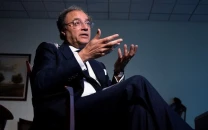Trials of Pakistani cinema
Is it possible that Indian industry might be behind the lobbying to keep local or other foreign competitors out?

A screengrab of Shah Rukh and Mahira Khan in Raees. PHOTO: YOUTUBE
The first was on the Broadway. Cirque du Soleil’s first Broadway show Paramour in the historic Lyric theatre. Despite being overshadowed by the success of Hamilton, it nevertheless was a feast for senses and readily transported me back to my wondering childhood. The second was far less ceremonious. In St Louis, Missouri I had time to kill before my next appointment when I learned that my hotel of residence housed a multiplex. Watching movies there was a treat.
There is something ethereal and overpowering about good storytelling. It unburdens you of your immediate worries. A country troubled by circumstances like ours should also have some modicum of such entertainment if it wants to forget the trials of everyday life, every now and then. That was the thought on my mind at that time. But in contrast just take a look at Islamabad. It is not a small city anymore. But there is only one decent Cineplex in town. And theatres elsewhere in the country, save a few examples, are struggling at best. If you think it has something to do with the digital age or temporary bans on the Indian content, then think again. Before Musharraf’s rule, Indian movies were not allowed to be screened in Pakistani theatres. Even when bootlegged Indian content was being distributed like candy in the country, our cinema was still carrying on.
In 1998 our industry released Syed Noor’s Choorian which managed to gross around Rs180 million. In 2002 Javed Sheikh’s Yeh Dil Aap Ka Huwa earned around Rs200 million. Not a wholly remarkable performance I grant you, but the theater business was still afloat and cinemas were not being converted into malls. Titanic, a Hollywood film did a decent job in late 1990s as well despite its foreign language. But our cinema witnessed a sharp decline in Musharraf’s time. Add to it the fact that only few years earlier Pakistan Television had hired an MD from abroad who, seeing financial strains, had decided to discontinue PTV’s in-house production of plays and you begin to appreciate the famine of entertainment this country endured for past one-and-a-half decades. Television drama is being revived by our private sector now but cinema is still struggling. And somewhere in the middle is the hectic lobbying to retain Indian content. The last bit troubles me most.
It was when PTV stopped producing dramas and the private production houses could not do justice to the art of storytelling that Indian content entered our market. Similarly, back in 2000s our cinema took a nosedive and the state eventually relaxed ban on Indian movies. While our collective ineptness and wholesale collapse of imagination is mainly to blame for our dwindling entertainment industry, has it occurred to anybody that there might an elaborate attempt to stifle it from without?
I have no qualms in accepting that the Indian content will be available and consumed in Pakistan in one form or the other. It survived Ziaul Haq’s time when bootlegged VHS copies were widely available in the market. It is the resistance to any attempts to move beyond this content that frustrates me. Remember when Turkish plays dubbed in Urdu were first introduced in our market. There was huge resistance. However, I failed to see same fervor when Indian content was being introduced on our television screens. Similarly, during few months of ban on Indian movies in our cinema we saw a pitched battle in support of lifting the ban. The same elements start throwing tantrums when ideas are floated to screen Urdu dubbed Hollywood movies in our cinema. A bid to launch Pakistan’s own DTH service and ban Indian illegal DTH witnessed a similar coup.
It also hurts my mind to think that its one-size-fit-all riffraff would naturally defeat highly nuanced and tastefully done American content in demand without such lobbying. Is it possible that Indian industry might be behind the lobbying to keep local or other foreign competitors out? Businesses usually do that. But at least in the world of cinema Bollywood doesn’t need this market. It already earns a lot through its business around the globe thanks to its strong diaspora. Ours is a very small market. The other motivation could purely be political.
The writer is an Islamabad-based TV journalist and tweets @FarrukhKPitafi
Published in The Express Tribune, December 24th, 2016.
Like Opinion & Editorial on Facebook, follow @ETOpEd on Twitter to receive all updates on all our daily pieces.















COMMENTS
Comments are moderated and generally will be posted if they are on-topic and not abusive.
For more information, please see our Comments FAQ